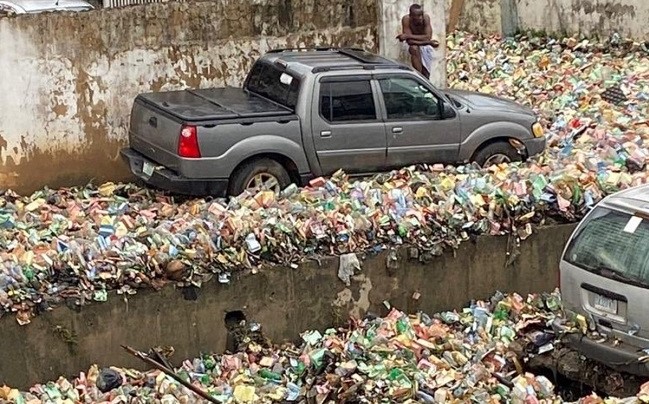In the heart of Nigeria’s commercial capital, Lagos, a silent storm is mounting – one not of wind or waves, but of waste. Plastic waste.

From clogged drainages in Makoko to plastic-laden shorelines in Lekki, the state’s 180 km coastline and sprawling urban landscape are under siege. Every day, an estimated 13,000 metric tons of waste are generated in Lagos, and more than 80% of it is plastic. This overwhelming volume – largely composed of post-consumer items, such as PET bottles, Styrofoam containers, and plastic bags – is choking ecosystems, endangering marine life, and exacerbating flooding and disease outbreaks.
For Doyinsola Ogunye, founder of Recycling Scheme for Women and Youth Empowerment (RESWAYE), the evidence is not just scientific – it’s visual, visceral, and immediate.
“Plastic pollution in Lagos is deplorable,” she said. “Our waterways, drainages, and even the soil are saturated with plastics. It’s a problem that has leached into every part of our lives – including our food chain.”
From Plastic Use to Plastic Ingestion
Ogunye describes a typical journey of a discarded plastic item: a water bottle tossed onto the roadside gets washed into a drainage, eventually flowing into the lagoon and into the ocean.
There, it joins millions of other plastic particles and – alarmingly – begins its return journey to human consumption.
“We eat from the ocean, and we forget that these plastics return to our plates as microplastics. Even ghost nets – abandoned plastic fishing gear – trap fish and other marine animals long after they’re dumped.”
It’s not just an environmental concern, she stressed. It’s a public health emergency.
From viral videos of plastic straws embedded in sea turtles’ nostrils to dead whales found with bags in their stomachs, the consequences are tragic and far-reaching. Sea turtles mistake plastic bags for jellyfish. Dolphins and fish unknowingly ingest microplastics. And humans – part of the same biosphere – are now discovering microplastics in bloodstreams, lungs, and even placentas.
The SDG Clock Is Ticking
As a Goalkeeper for the Bill and Melinda Gates Foundation, Ogunye understands the urgency of Sustainable Development Goal 12: Responsible Consumption and Production. With 2030 fast approaching, she warns that time is not on our side.
“We’re running out of time,” she said. “To meet our SDG targets, we must scale up plastic management efforts now. This isn’t just about Lagos – it’s a global crisis with local consequences.”
Policy Progress and Enforcement Gaps
While Nigeria has a National Policy on Plastic Waste Management, Ogunye points out that implementation has been weak. In contrast, she praises Lagos State’s efforts, especially under the stewardship of Hon. Tokunbo Wahab, Commissioner for the Environment and Water Resources.
“The Lagos plastic ban conversation started last year. We’ve made progress – many supermarkets have stopped giving out plastic bags, and Styrofoam use is declining. Enforcement of the ban starts officially on July 1, 2025, and that’s encouraging.”
However, Ogunye insists that policy without public buy-in is like a law without enforcement.
“We need to intensify advocacy and sensitization. People must understand why this matters. Before we enforce, we must offer alternatives.”
Coconut Straws and Innovative Solutions
What could these alternatives look like? According to Ogunye, innovation is already blooming in places like India.
“Someone is using coconut branches to make biodegradable straws that last four hours in water. Coconut trees are everywhere – we could plant 50,000 annually to support that industry. The solution is not scarcity – it’s vision.”
She calls for support of innovation hubs, recycling startups, and grassroots solutions that can address the scale of the crisis. But innovation alone isn’t enough – it must be backed by acceleration.
From Conference Rooms to Coastal Communities
Ogunye is passionate about taking the fight beyond boardrooms.
“We do a lot more talking than acting. We need to hit the ground – engage local communities, markets, schools, and youth corps members. The energy and tech skills of Gen Z and Gen Alpha are unmatched. They can help us do in minutes what used to take days.”
And she isn’t exaggerating. With the rise of AI and digital tools, Ogunye believes that awareness, data collection, and behavior change can occur more quickly if young people are empowered and platforms are leveraged effectively.
A Call to Action for Lagosians
Her advice to fellow Lagosians is direct: plant more trees, reduce plastic use, and recycle intentionally. Tap into the vast potential of the state’s untapped beaches, marine resources, and creative youth population.
“This is a communal effort. The government alone can’t fix it. It’s about us, the people, the private sector, the tech innovators, the traders, the consumers. Everyone has a role to play.”
Conclusion: A Chance to Lead the Continent
Lagos, the economic nerve of West Africa, has the chance to lead the continent in environmental action. With a population of over 20 million and rising tides – both figuratively and literally – the fight against plastic pollution must become everyone’s business.
“Plastic pollution is bigger than Lagos,” Ogunye concluded. “But Lagos has the energy, innovation, and urgency to be the first African city to turn the tide. The question is: will we rise to the challenge?”
By Ajibola Adedoye
This article (“Turning the Tide: How Lagos Can Win the Battle Against Plastic Pollution”) was funded by a grant from the United States Department of State (via Wild Africa). The opinions, findings, and conclusions stated herein are those of the author(s) and do not necessarily reflect those of the United States Department of State
